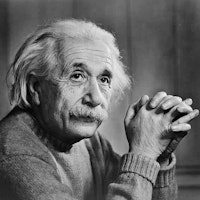I believe that we don’t need to worry about what happens after this life, as long as we do our duty here—to love and to serve.
Albert Einstein

Selfless Service
Topic: Serving Others
I believe that we don’t need to worry about what happens after this life, as long as we do our duty here—to love and to serve.
Albert Einstein, born on 14 March 1879 and passing away on 18 April 1955, stands as one of the most renowned theoretical physicists in history. Best known for his groundbreaking special and general theories of relativity, his scientific endeavors spanned a multitude of areas within the field of physics. Amongst his numerous accolades, he was awarded the Nobel Prize in physics for his elucidation of the photoelectric effect—a phenomenon that expanded the horizons of quantum theory.
Einstein's journey, however, wasn't merely defined by scientific discoveries, but by the myriad challenges he overcame across various dimensions of his life. In his spiritual journey, he grappled with the concepts of God and universe. Socially, he navigated the complexities of his time—facing the rise of anti-Semitism, experiencing exile from his homeland due to Nazi oppression, and advocating for civil rights, disarmament, and global peace. These adversities only strengthened his resolve and underscored his resilience.
Beyond his professional accomplishments, Einstein's life was enriched by a tapestry of relationships and dialogues with luminaries from diverse fields. He engaged in profound conversations on the nature of reality with the likes of the Indian poet Rabindranath Tagore, discussed the principles of non-violence with Mohandas Gandhi, and deliberated on humanitarian issues with Albert Schweitzer. Furthermore, his camaraderie with fellow scientists and physicists provided a fertile ground for intellectual exchanges, fostering an environment of collaboration and innovation during one of the most exciting epochs in scientific history.
Einstein and the Poet
Einstein, Albert, and William Hermanns. Einstein and the Poet: In Search of the Cosmic Man. Branden Press, 1983.

Albert Einstein
Theme: Serving

About This Albert Einstein Quotation [Commentary]
Albert Einstein’s philosophy, “I believe that we don’t need to worry about what happens after this life, as long as we do our duty here—to love and to serve,” highlights the intrinsic value of service and love. For Einstein, these actions were not just moral imperatives but the core of a meaningful life. He champions the idea that by dedicating ourselves to service and love, we fulfill our earthly duties, thereby transcending concerns about the afterlife. His perspective encourages us to invest our energies in creating positive impacts in the lives of others, viewing this as the essence of our existence and the ultimate expression of our humanity.
In Einstein’s integrated view of the world, service is a natural extension of the harmony between science and religion, both of which aim to uncover truth. He saw the act of serving others as a manifestation of this truth, a concrete expression of the universal laws that govern our existence. Einstein’s belief in a rational universe where law underlies each event translates into a moral philosophy where love and service are logical responses to the fabric of life. They become acts that align with the cosmic order, essential for personal fulfillment and societal progress.
Einstein’s emphasis on the present moment and the tangible acts of love and service reflects his conviction in the practical application of one’s beliefs and values. He regarded service not as a burden but as a privilege, a means to connect with and improve the world around us. By living a life marked by deliberate kindness and helpfulness, Einstein believed we tap into the rational, compassionate spirit that moves the universe, embodying the ideals that foster a harmonious and purposeful existence.
Additional Quotes from Einstein and the Poet
Related Quotes
Copyright © 2017 – 2025 LuminaryQuotes.com About Us